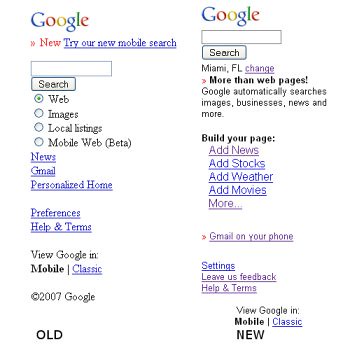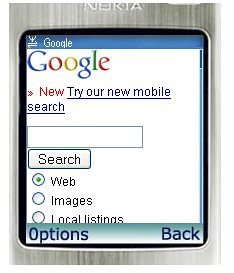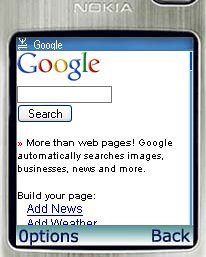Google launched its new mobile search engine a few days ago.I’ve blogged about it on this post and highlighted the main features.While I think the new user Interface is better than the last one, I’m really saddened (and annoyed) by the fact that Google doesn’t allow users to search inside their mobile web index.

Instead, it has chosen to mix mobile web results with the regular web results depending on the users query. Google must think that because they transcode all pages, users will be happy with what will be displayed on their phones.
Google has probably analyzed the search behavior of mobile users, and depending on where they clicked (web or mobile results), they’ve now decided what to show to the user, without the need for them to select what kind of results they wanted to see.
So, that would mean that this new mobile search engine uses some sort of semantic technology…Yeah, right, the desktop engine is not a fully-fledged semantic search engine and Google wants us to believe that this is the case with the new mobile search engine.
So let’s see how good this new version is. Let’s say that I want to use Google on my phone to search for “ringtones”. With the new version of Google, we have these 6 results on the first page (I did this test with a SonyEricsson W600i):
1. http://www.ringophone.com: transcoded web page : Even if the page was taking so much time to load, I tried to make a purchase and on the next page, my phone displayed an error message saying that the “page was too large to load”
2. http://www.mtv.com/mobile/ringtones/: transcoded web page: Flash Site, unable to buy a ringtone (I got the “page too large to load” message)
3. http://en.wikipedia.org/wiki/Ringtones: transcoded web page, Wikipedia page
4. http://department.monm.edu/uptildawn/forum/00000b93.htm?ringtones: spam page
5. http://www.ringtonejukebox.com: transcoded web page, again, I’m unable to browse properly and to purchase a ringtone.
6. www.umes.edu/accsupport/ossd/ossdchat/0000008d.htm?ringtones: spam page linking to a page full of ads (not displayed on my phone)
If you click on the next pages, you’ll only get regular web pages and the user experience will be the same.
If users still had the ability to see only mobile pages, their experience would be better (not excellent though). These are the results you would get if you selected “Mobile Web” on the previous version of Google Mobile. You’ll find mobile sites that will display properly on your browser an that have a mobile specific payment solution, for example this site.
So, did Google just go out of its mind?Why did they abandon the mobile web as a source of results? Transcoding pages is not the best solution to ensure a good user experience. There are more and more mobile websites that are user friendly and Google’s just decided to burry them.
I’ve sent a feedback to Google and I hope they will bring back the “mobile web” soon, as I’m sure a lot of people are going to loose a lot of traffic because of that, and users won’t be satisfied either.
[UPDATE]If you are involved in the mobile web and don’t want to lose traffic, please consider leaving a feeback with the comment form on Google Mobile to bring back the mobile web as a separate source of results. Also, please read Dennis’ post on Wap Review who also complains about this issue.





